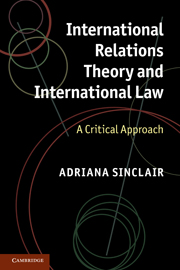Book contents
- Frontmatter
- Contents
- Acknowledgements
- Introduction
- 1 The theoretical foundations of constructivism and its treatment of law
- 2 Challenging the common sense idea of law
- 3 Introducing critical jurisprudence
- 4 Brown, desegregation and racism in America
- 5 Constructing rape
- 6 Law and normative backsliding
- Conclusion
- Bibliography
- Index
6 - Law and normative backsliding
torture since 9/11
Published online by Cambridge University Press: 05 June 2012
- Frontmatter
- Contents
- Acknowledgements
- Introduction
- 1 The theoretical foundations of constructivism and its treatment of law
- 2 Challenging the common sense idea of law
- 3 Introducing critical jurisprudence
- 4 Brown, desegregation and racism in America
- 5 Constructing rape
- 6 Law and normative backsliding
- Conclusion
- Bibliography
- Index
Summary
Introduction
In Foot’s account of the evolution of the torture norm, she traces its origins back to the Enlightenment thinker Beccaria. However, it was not until the end of the Second World War that such moral reasoning gained a foothold in international law. The 1948 Universal Declaration of Human Rights was the first to outlaw torture, followed swiftly by the Geneva Conventions in 1949. However, according to Foot, it was not until the emergence of Amnesty International that commitment to ending torture moved beyond words and into deeds.
It was in this climate, Foot argues, that torture came to be established as illegal and publicly condemned. Donnelly also claims that this period marked the establishment of a new standard of civilisation in which membership in international society depended on the extent to which governments observed human rights standards. And no norm in the human rights pantheon is as admired or well-established as the norm against torture, enshrined in the 1984 Convention Against Torture. Sussman argues that: ‘In philosophical and political discussion, torture is commonly offered as one of the few unproblematic examples of a type of act that is morally impermissible without exception or qualification.’
- Type
- Chapter
- Information
- International Relations Theory and International LawA Critical Approach, pp. 141 - 169Publisher: Cambridge University PressPrint publication year: 2010



